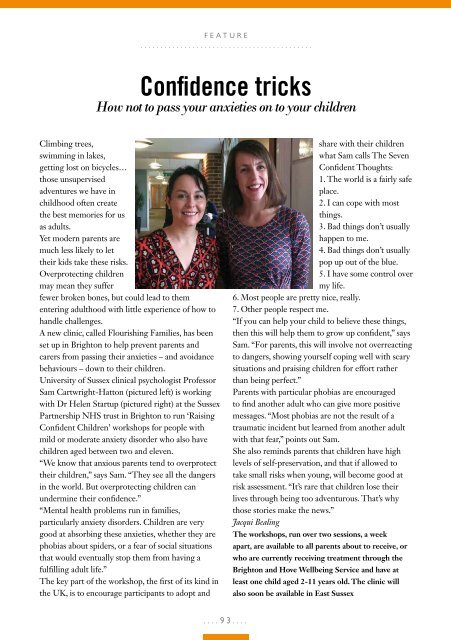Viva Brighton Issue #66 August 2018
You also want an ePaper? Increase the reach of your titles
YUMPU automatically turns print PDFs into web optimized ePapers that Google loves.
FEATURE<br />
...........................................<br />
Confidence tricks<br />
How not to pass your anxieties on to your children<br />
Climbing trees,<br />
swimming in lakes,<br />
getting lost on bicycles…<br />
those unsupervised<br />
adventures we have in<br />
childhood often create<br />
the best memories for us<br />
as adults.<br />
Yet modern parents are<br />
much less likely to let<br />
their kids take these risks.<br />
Overprotecting children<br />
may mean they suffer<br />
fewer broken bones, but could lead to them<br />
entering adulthood with little experience of how to<br />
handle challenges.<br />
A new clinic, called Flourishing Families, has been<br />
set up in <strong>Brighton</strong> to help prevent parents and<br />
carers from passing their anxieties – and avoidance<br />
behaviours – down to their children.<br />
University of Sussex clinical psychologist Professor<br />
Sam Cartwright-Hatton (pictured left) is working<br />
with Dr Helen Startup (pictured right) at the Sussex<br />
Partnership NHS trust in <strong>Brighton</strong> to run ‘Raising<br />
Confident Children’ workshops for people with<br />
mild or moderate anxiety disorder who also have<br />
children aged between two and eleven.<br />
“We know that anxious parents tend to overprotect<br />
their children,” says Sam. “They see all the dangers<br />
in the world. But overprotecting children can<br />
undermine their confidence.”<br />
“Mental health problems run in families,<br />
particularly anxiety disorders. Children are very<br />
good at absorbing these anxieties, whether they are<br />
phobias about spiders, or a fear of social situations<br />
that would eventually stop them from having a<br />
fulfilling adult life.”<br />
The key part of the workshop, the first of its kind in<br />
the UK, is to encourage participants to adopt and<br />
share with their children<br />
what Sam calls The Seven<br />
Confident Thoughts:<br />
1. The world is a fairly safe<br />
place.<br />
2. I can cope with most<br />
things.<br />
3. Bad things don’t usually<br />
happen to me.<br />
4. Bad things don’t usually<br />
pop up out of the blue.<br />
5. I have some control over<br />
my life.<br />
6. Most people are pretty nice, really.<br />
7. Other people respect me.<br />
“If you can help your child to believe these things,<br />
then this will help them to grow up confident,” says<br />
Sam. “For parents, this will involve not overreacting<br />
to dangers, showing yourself coping well with scary<br />
situations and praising children for effort rather<br />
than being perfect.”<br />
Parents with particular phobias are encouraged<br />
to find another adult who can give more positive<br />
messages. “Most phobias are not the result of a<br />
traumatic incident but learned from another adult<br />
with that fear,” points out Sam.<br />
She also reminds parents that children have high<br />
levels of self-preservation, and that if allowed to<br />
take small risks when young, will become good at<br />
risk assessment. “It’s rare that children lose their<br />
lives through being too adventurous. That’s why<br />
those stories make the news.”<br />
Jacqui Bealing<br />
The workshops, run over two sessions, a week<br />
apart, are available to all parents about to receive, or<br />
who are currently receiving treatment through the<br />
<strong>Brighton</strong> and Hove Wellbeing Service and have at<br />
least one child aged 2-11 years old. The clinic will<br />
also soon be available in East Sussex<br />
....93....


















